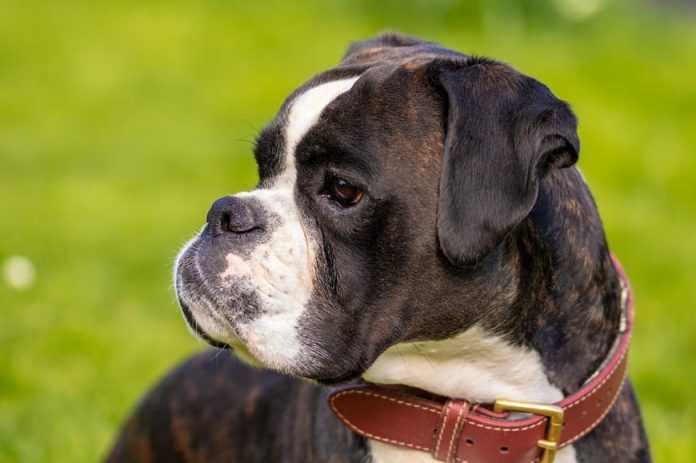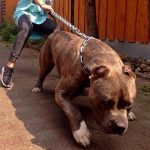A boxer is the result of breeding the Old English Bulldog and the extinct Brabanter Bullenbeisser. This purebred dog is a working dog best known for its intelligence and strength. It can be a great guard dog since it barks and howls on strangers. Is it true that Boxers live longer than their descendants, the Old English Bulldogs? Read on to find out!
The Boxer Dog’s Life Expectancy
On average, a boxer dog lives 10-12 years. They have a 10 and a half years median lifespan, which is not as long as other purebred dogs. This is because they are quite susceptible to a few life-threatening conditions such as heart diseases and cancers. Still, there are Boxers that made it to more than 12 years old.
Maccabee, a Boxer from California, is the oldest Boxer dog documented. He lived until he was 16 but started to show signs of illnesses at the age of 8. Same as Maccabee, a Boxer named Brewski also lived until he was 16. He died after suffering from severe seizures.
Like Maccabee and Brewski, your dog can possibly pass the 16 year-old mark. You just have to exert more effort because caring for a senior dog is a whole lot different story compared to caring for him when he is a pup. In human years, that age is already equivalent to 80-120 years old.
Things to Love about Boxers
Boxers will try to please you until you love them! They just look tough, because of their muscular appearance but they can be very affectionate deep inside. The majority of boxers have a good temperament, making them an ideal dog for houses with children. They can be loyal and very close to their owners.
Boxers possess an above the average sense of smell. This is the reason why many of them are being used to help in fire fighting. When trained to socialize early in life, boxers will enjoy hanging out with other dogs and exploring new places. This dog breed would not mind being the center of attention.
How to Help Your Boxer Life Longer
Any dog, including boxers, could live longer than its average lifespan when given the best care. As an owner of a boxer dog, here are the most important things you should be aware of:
Feed him high-quality food
Your boxer’s feeding requirement will depend on his age and size. Do note that boxers are prone to bloating, which means you have to control his meal servings. Only follow the recommended serving per age and size if you are planning to give your dog a commercial diet. Otherwise, your Boxer will suffer from bloating which can be life-threatening.
If you are planning to give him homemade meals, make sure they are fresh and prepared well. Dog owners who give their boxers a raw food diet usually give raw meats, eggs, fish, dairy, and veggies.
Stay away from wheat, soy, and corn because these items usually cause allergies in boxers and they only provide an insignificant amount of nutrition for your pooch. Do note that boxers can become hypersensitive after consuming certain types of foods, so be cautious when feeding anything new to them.
Bathe him only once a month.
Boxers are self-groomers so you don’t really need to exert an extra effort in keeping them clean. Before bath time, get rid of the tangles and snarls from your boxer’s coat using a brush. Use a mild dog shampoo or a human baby shampoo when cleaning your dog’s coat. You can use a handheld blower on low heat to help your boxer dry down.
If you have a Boxer puppy, don’t bathe him until he is two to three months old. he should be with his mother during the first few weeks of life and it is in the mother’s instinct to clean his litter through licking. In case the pup gets dirty, you can clean it with a wet washcloth. You should time your pup’s bath time to more than a week since he received his vaccine.
Brush the coat once a week.
Boxers tend to shed a lot and you can control this by brushing their short coat weekly. You can keep it shiny by occasionally wiping it with a chamois cloth. It also helps to use a freshening spray while brushing your boxer’s coat. It helps in detangling as well as getting rid of the unwanted smell from your dog’s skin.
Clean his ears once or twice a month.
It’s best to use an ear wipe intended for dogs if you don’t want to use ear drops. When buying a cleaning wipe for your boxer, consider one that does not contain alcohol and is made of ingredients that will not irritate your pup. Your vet might recommend an ear cleaning solution if your dog is prone to ear infection.
Take him out for a walk twice or thrice a day.
Boxers require a great amount of physical activity so they need to be walked at least two times a day. If it is not possible to go outside, you can play fetch with him inside if you have the space.
Boost his immunity through vaccination
The recommended time for a boxer’s first vaccine should be when he is 45 days old. Your dog should be given all the core vaccines, which protect him from canine rabies, parvo, infectious hepatitis, and distemper.
Keep your boxer hydrated
Make sure that there is fresh and clean water always available for your pooch. Dogs should be drinking an ounce of water per pound of weight every day. This can increase depending on your dog’s diet. If he often eats dry food, you have to give him lots of water. However, if he is on a moisture-rich diet, don’t force your boxer to drink when he does not want to.
Give him filtered water, especially when he is sick. Filtered water is recommended for dogs because it is free from fluoride and trace metals that can cause ill effects in the long run. Avoid giving tap water as much as possible.
Maintain dental hygiene
Part of cleaning a boxer involves keeping his mouth clean. This is to get rid of periodontal diseases such as gingivitis and dental plaque. Use canine-specific toothpaste when brushing your boxer’s pearly whites.
In case your boxer hates having his teeth cleaned, you can try giving him dental chews. These can clean his teeth and also keep bad breath at bay. There are also dental wipes especially created for pets.
Common Health Problems of Boxers
It is important to be aware of the potential issues of boxers, so you can take action early on. Help your boxer have a long and happy life with these boxers care tips:
- Boxer Cardiomyopathy – a boxer could inherit this condition that causes the irregularity of the heartbeat. Some cases of cardiomyopathy result in congestive heart failure. Aside from an irregularity of the heartbeats, a dog with this condition will also show symptoms like coughing, fainting, and abnormally fast breathing.
- Seizures – unfortunately, there is no known cure for canine seizures. Anti-seizure medications will not address the issue but they can still help in preventing them for a short period of time. Never interfere when your pet is having seizures. Once he is in his usual state again, it is time to take him to the vet for further evaluation.
- Cancer – it is identified as the leading cause of death in boxers with around 44% of deaths occurring because of it. The symptoms of cancer in dogs are bumps/lumps, sudden weight loss, increased or decreased bowel movement, and lethargy.
- Hip Dysplasia – this skeletal condition can be inherited but poor nutrition and a few environmental factors also contribute to its development. Limping or displaying pain in the back leg is the early sign of hip dysplasia. If you believe your boxer is experiencing this condition, take him to a vet immediately so he will get the necessary treatment.
- Gastric Dilation-Volvulus or Bloating – as mentioned above, bloating is quite prevalent among boxer dogs because of their deep and narrow chest. It happens when the stomach accumulates too much fluid or air. You can prevent bloating by feeding your dog multiple meals in restricted portions. Avoid exercising an hour before or after your boxer’s feeding time.
Important Reminders Before Adopting a Boxer
Before deciding to get a boxer, you have to be aware of all their common traits, living environment, exercise requirements, feeding needs, and grooming essentials. Although dogs are different in general, boxers still share a number of common traits.
One of the not-so-pleasant characteristics of boxers is barking very often and chewing on things. This happens when the boxer is not trained well. Sometimes, the negative traits are also the result of bad breeding so make sure that you are only adopting from reliable breeders.
An ethical breeder will not mind if you have a lot of questions throughout the process. The breeder should be able to answer your queries regarding the proper handling of boxers, especially if you are a first-time dog owner.
In case you are planning to adopt one from a rescue organization, expect that any medical problem that will arise will now be your obligation as the new pet’s parent. Many rescue centers already spay or neuter the dogs and deworm them before giving them to the new owner. These organizations usually schedule a home visit first to see if your home is fit for a boxer dog.
Remember that boxers are not hypoallergenic dogs so it may not be the right breed for you if have a lot of allergies. They tend to salivate excessively so if you are not prepared for lots of saliva from your buddy, then consider another breed instead such as a Poodle or a Yorkie.
Conclusion
Boxers usually live until they are 10 or 12, but can start to slow down as early as 8 years old. To help your Boxer enjoy his seniority, give him a well-balanced diet and make sure he’s getting medical attention when needed. A boxer with a good breeding and a healthy lifestyle will likely have an increased lifespan.
Boxers may be prone to many health issues, but it’s still worth adopting one. A boxer could love you and your family and even protect you from strangers. The best thing about having a boxer is having a loyal companion.























